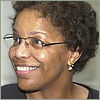
Joan Reede
An expert on surmounting myriad challenges to address issues of diversity and equality in academia, Joan Reede, dean for Diversity and Community Partnerships at Harvard Medical School, says it is absolutely vital to have leaders to champion the cause.
"Our goal is to serve society, and we need a system that is reflective of that society and serves the needs of that society," said Reede, who spoke to about 100 faculty and staff at UCSF on March 1.
An associate professor of medicine, Reede, MD, MPH, MS, became the first African-American woman to become a dean at Harvard Medical School (HMS) in January 2002. Appointed by former UCSF Chancellor Joseph B. Martin, now dean at HMS, Reede is one of a few African-American women to serve as dean at a US medical school. She is responsible for developing and managing a comprehensive program that provides leadership, guidance and support to promote the increased recruitment, retention and advancement of under-represented minority faculty at HMS. Her job also includes overseeing all diversity activities for faculty, trainees, students and staff at HMS.
As a guest of the UCSF School of Medicine, which recently formed a task force to address issues of diversity, Reede met with faculty and staff to discuss strategies for increasing diversity and equity.
The event was coordinated and organized by the UCSF Center for Gender Equity and the Chancellor's
Advisory Committee on the Status of Women (CACSW), which recently issued a report on the progress made over the past 30 years to achieve equality for women at UCSF. The report, titled))"
Slow Steps to Change" (pdf), concludes that the"clear lesson to be learned from the history of CACSW is that women who work together to promote positive policies and to overcome overt prejudices or unintentional biases can make important steps forward."
Over the past 12 years, Reede has created and developed programs designed to assist both women and under-represented minorities achieve their potential in academia.
She works to feed the pipeline of under-represented minority students entering the higher education system as well as to recruit, mentor and promote under-represented minorities as fellows and junior faculty working at HMS. Her office works with K-12 schools to develop curricula, offer student enrichment opportunities and train teachers in ways similar to UCSF's Science Education Partnership. For fellows and junior faculty, Reede's office also offers career development and training in skills -- not typically taught in medical school -- such as negotiating, resolving conflicts, running a meeting and dealing with the media.
Achieving Excellence
"Diversity is a part of achieving excellence," Reede said. "Diversity in thought, research and personnel workforce - they are all important components in achieving excellence in an academic environment."
But the challenges are great, Reede says, since societal barriers to achieving diversity in academia are multiple: lack of awareness of career options, insufficient resources, inadequate preparation of young students, and an institutional culture of policies and practices that make it hard for under-represented minority faculty and staff to advance.
Reede stressed six important strategies for overcoming these obstacles. They are to strive for continuity across academic levels, collaborate with K-12 schools to ensure students are prepared to succeed, build coalitions or partnerships with the community and communicate the goals of diversity and success stories to the public, peers and policymakers.
Reede noted that being consistent is probably one of the most important strategies for achieving diversity. All too often, she said, institutions start diversity programs that are not well maintained, monitored and measured over the long haul. Building diversity is a long-term process, Reede said.
"Leadership is critical," Reede noted in explaining a pyramid of responsibility to achieve diversity and equity. "You can do things from the bottom up, but it has to come from the top down, too. Leaders have to set the tone. Leadership needs to model the behavior that they want people to follow."
Ironically, Reede was asked about the widely reported controversial comments recently made by Harvard University President Lawrence Summers. He suggested that the under-representation of women in engineering and some scientific fields may be partly due to inherent differences in the intellectual abilities of men and women.
"The concept that women or people of color are not as smart is not unique," she said. "It is out there and it is pervasive. And part of me believes that I don't have to change their minds. There is for me so much work to be done that I don't want to be sidetracked."
Diversity, she emphasized, is not just about minorities, men or women. "It's about creating a system that is fair."
In addressing equity, Reede says it's important to look at factors such as workload, salary, space and travel opportunities.
Reede also emphasized the point of looking at the policies and practices and the criteria for faculty promotion. Traditionally, faculty can advance their careers by publishing their research in peer-reviewed scholarly journals or by winning major grants and awards for their research. But at Harvard Medical School, faculty members are also evaluated for their contributions to mentoring and serving the community.
To answer critics who see enhancing diversity as pursuing arbitrary quotas or eroding quality, Reede says matter-of-factly: "At no point in time are we talking about lowering standards. Achieving diversity is about excellence. It's about setting high expectations. It's about challenging the norm and asking, 'Why are we doing things this way?'"
Photo by Liza Green, HMS Media Services
Source: Lisa Cisneros
Related Links
Joan Y. Reede, Harvard Medical School
Office for Diversity and Community Partnership, Harvard Medical School

